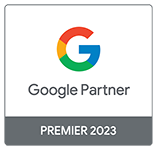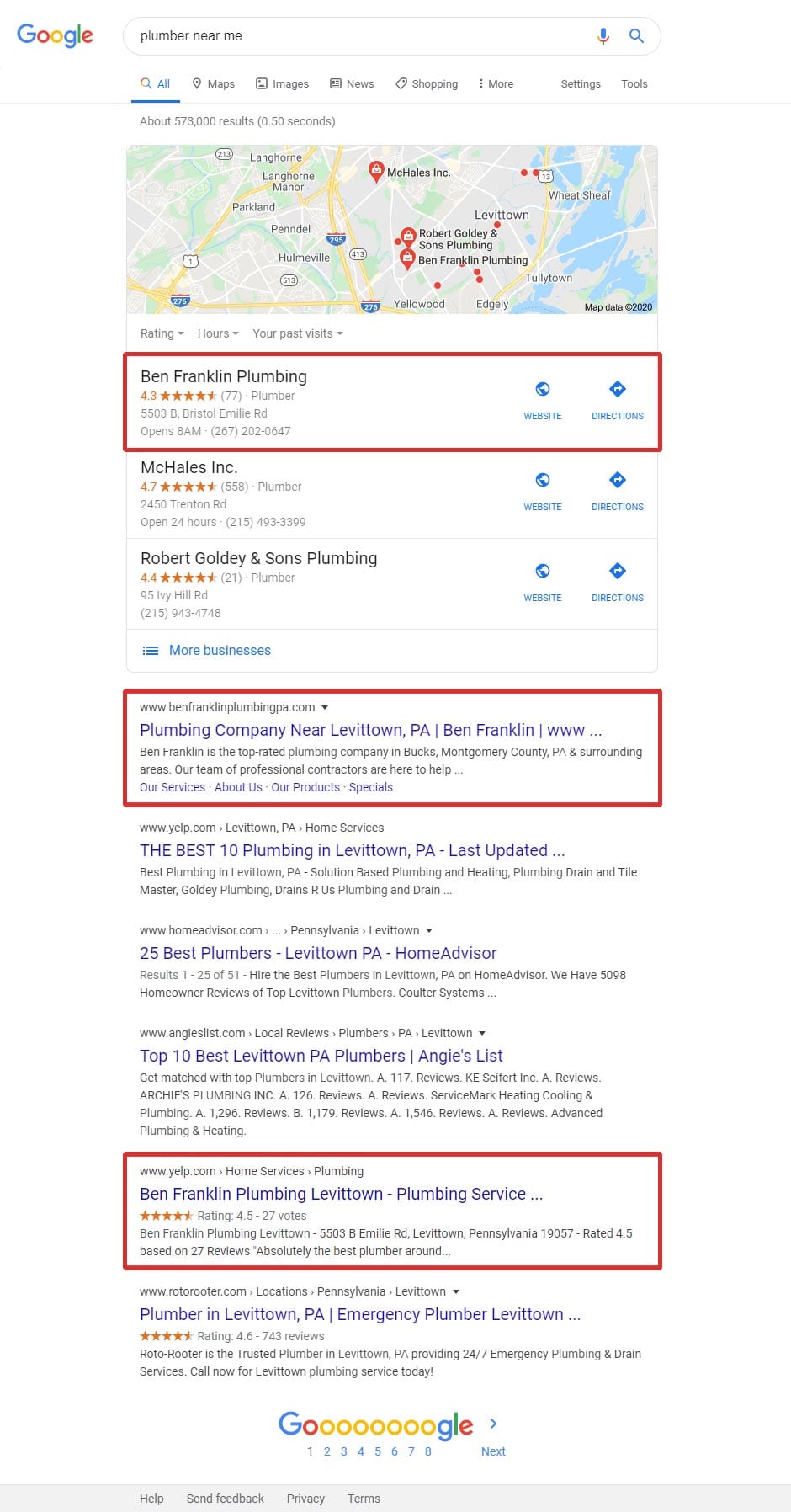Speak To An Expert Now: 215-946-1046
- Home
- About Us
- Services
- Digital Marketing ServicesCreative Services
- Who We Serve
- Testimonials
- Resources
- Home
- About Us
- Services
- Digital Marketing ServicesCreative Services
- Who We Serve
- Testimonials
- Resources


Is your site not being found by your customers?








Bing

Yahoo

YouTube

Companies serving a specific area need to master local SEO best practices so that people nearby find you easily.
Big brands and eCommerce websites need to compete for search rankings across the country with a strong SEO strategy.
Selling products and services around the globe requires an SEO approach that covers multiple languages.
SEO is short for search engine optimization. It’s the effort to have your website’s pages shown at the top of organic search results. It involves creating website pages in a way that satisfies keywords typed into a search engine, so that users find what they’re looking for on the internet.
Google is by far the most popular search engine in the world — using the most complex algorithm in the world — and SEO pros often refer to Google when speaking about search engines in general. We’ll talk a lot about what Google “wants” throughout this article, and some of it can seem detailed and complicated. But there’s one simple rule to keep in mind about SEO: Google wants to provide the best experience to the user. SEO isn’t about gaming the system. It’s about providing value. If you want people to come to your website, you need a website that’s worth coming to.
Search engine optimization is essential for any business trying to attract visitors to a website. Ninety-three percent of all web traffic comes from search engines. No matter what type of website you’re running, you should invest in SEO efforts, whether you invest with time or money. If you have a dedicated team of SEO strategists, content writers, designers, developers, and data analysis professionals, you may be able to do SEO in house. For most businesses, though, in-house SEO isn’t feasible. That’s where we come in.
1SEO Digital Agency started as an SEO company, and we’ve grown to include a full suite of digital marketing services to a wide range of clients. We know SEO inside and out, and we customize our work to fit the needs of our clients. We have the track record to prove it.
This article will teach you a lot about SEO, from the basics to the advanced details.
Here are a few SEO-specific definitions:
Keyword: A phrase that someone types into a search engine
Search Results: The listing of links to pages that appears after you’ve searched a keyword, often called SERPs, for search engine results pages
Rank: Where in the SERP a page is listed. The first link is #1, the next is #2, etc.

SEO is short for search engine optimization. It’s the effort to have your website’s pages shown at the top of organic search results. It involves creating website pages in a way that satisfies keywords typed into a search engine, so that users find what they’re looking for on the internet.
Google is by far the most popular search engine in the world — using the most complex algorithm in the world — and SEO pros often refer to Google when speaking about search engines in general. We’ll talk a lot about what Google “wants” throughout this article, and some of it can seem detailed and complicated. But there’s one simple rule to keep in mind about SEO: Google wants to provide the best experience to the user. SEO isn’t about gaming the system. It’s about providing value. If you want people to come to your website, you need a website that’s worth coming to.
Search engine optimization is essential for any business trying to attract visitors to a website. Ninety-three percent of all web traffic comes from search engines. No matter what type of website you’re running, you should invest in SEO efforts, whether you invest with time or money. If you have a dedicated team of SEO strategists, content writers, designers, developers, and data analysis professionals, you may be able to do SEO in house. For most businesses, though, in-house SEO isn’t feasible. That’s where we come in.
1SEO Digital Agency started as an SEO company, and we’ve grown to include a full suite of digital marketing services to a wide range of clients. We know SEO inside and out, and we customize our work to fit the needs of our clients. We have the track record to prove it.
This article will teach you a lot about SEO, from the basics to the advanced details.
Here are a few SEO-specific definitions:
Keyword: A phrase that someone types into a search engine
Search Results: The listing of links to pages that appears after you’ve searched a keyword, often called SERPs, for search engine results pages
Rank: Where in the SERP a page is listed. The first link is #1, the next is #2, etc.

SERPs usually show two main types of links: paid ads and organic listings.
Paid ads appear at the very top of search results, marked as ads. Businesses purchase these spots on a pay-per-click (PPC) basis. They get a very low percentage of clicks, but those clicks lead to purchases at a higher rate than organic listings. If you’re interested in launching a PPC campaign for your business, good news, 1SEO can help you. Learn more about our top-notch PPC services.
Organic listings make up the rest of the results. Your SEO efforts directly affect the rank in organic listings. There are several types of organic listings, depending on the search. Google does its best to provide search results that best serve the user.
Map packs usually show up for a localized search. If you search “lunch,” for example, Google will assume you want to find a restaurant nearby and show you a map with some restaurants pointed out.
Featured snippets will appear for searches with a clear, simple answer. If Google is confident it can find the answer to your search on a webpage, it “snips” that text and shows it, saving the user the trouble of clicking into a site. That may seem to punish websites for providing a clear answer, but statistics show that pages in featured snippets get more traffic than they would if they appeared in traditional listings.
The question box with the heading “People also ask” is a relatively recent addition to Google results, and it allows the user to see answers to related questions.
Videos and images naturally take the top spots for specific keywords. A good example is “how to tie a tie,” a query satisfied best by a short YouTube video rather than a written step-by-step guide.
Let's Start with the SEO Basics
Most SEO strategies start with keyword research. SEO pros use tools, such as Google Ads, SEMrush, and many others, to see the value of keywords. There’s search volume, the approximate number of times a keyword is searched monthly, and cost per click (CPC), taken from historical PPC bidding, which gives a clue as to the monetary value of bringing a single user to your site through a keyword.
An informational keyword such as “yankees roster” has no CPC because the user is just looking for a baseball team’s roster. The user gets the information and leaves. “Yankees tickets” would have a much higher CPC, because the user is very likely to buy game tickets once landing on a website.
Deciding on keywords shapes the group of pages you’ll create and optimize. For a given page, don’t just choose just one keyword; it’s smart to have a list of secondary keywords that help flesh out the topic of your page. When Google evaluates pages, it looks for keywords that relate to other keywords as a clue as to how valuable your page is.
Don’t fall into the trap of always shooting for the highest-value keywords. It’s smart to have realistic expectations. Your vintage baseball card store won’t rank first for the keyword “baseball,” no matter how hard you try. A company that sells cell phones may want to rank for “best cell phone,” but a simple Google search will show that the results are mostly lists and reviews of cell phones, not a single product page. Don’t ask, “What terms do we want to rank for?” Instead, ask, “What terms should we rank for?”
Once you have keywords to target, you can create the content of your pages. Antiquated SEO guidelines will tell you to force-feed the keyword into your content as much as possible. In an earlier time, search engines were less sophisticated, and this tactic worked. These days, Google and other search engines don’t fall for that. “Keyword stuffing” has no value. It’s a form of “tricking the search engine.” Don’t try to trick Google. The fundamental guideline is to satisfy the user’s query.
Here are some of the main elements of on-page content:
URL: the web address for the page
Meta title: the “official” title of the page, which appears in the tab at the top of a web browser and as the link in search results
Meta description: a short description of the page, usually 160 characters or less, appearing below the link in search results
H1 heading: the title as it’s shown within the page, usually in large, bold text
Body content: the bulk of the page’s offering, usually words, images, buttons, purchasing forms, etc.
Other headings: headings that separate the content, called H2, H3, H4, etc., based on their size and purpose in the page content, especially useful for long pages that cover a topic deeply
Writing SEO-friendly content can be a tricky proposition for many content writers. Google consistently urges websites to use natural language that speaks to your target audience. Use keywords liberally — it’s logical that your keyword will appear in the URL, meta title, meta description, H1 heading, and body content — but don’t overdo it. If you have a list of secondary keywords, don’t jam them into the content where they don’t belong. Even with secondary keywords, the guideline is still to satisfy the query.



Websites should be well organized, both for the user and for search engines. As a website manager, you want to use navigation links at the top of the pages and text links within the content to help users explore the site. All links should be placed logically, with text that is clear to the user. Links typically contain keywords that match the destination of the link, which helps your SEO efforts. One helpful guideline is to imagine a webpage with all the content removed, except for the links. Without the benefit of context, will users know where each link will send them?
Your URLs should be similarly buttoned up. Most websites use categories in their URL structure, like this:
www.yourwebsite.com/
www.yourwebsite.com/name-of-category/
www.yourwebsite.com/name-of-category/topic-of-page/
Ideal site organization requires solid planning from the start. Determine the main categories of the information or products you offer. eCommerce sites, in particular, tend to be very large and contain many categories. Use a URL structure that is reflective of the search intent, user experience, and keyword strategy.
Often referred to as “external links” and “off-page SEO,” backlinks are links that go from other sites to your site. Backlinks give Google a big clue into the value and reputation of your site among the rest of the online world. If other sites reference your site and are willing to send users there, your site must be pretty great. 1SEO offers link-building campaigns, as either part of an SEO services package, or by itself. Learn more about link-building for SEO.
SEO pros use tools, such as Majestic or Ahrefs, to look at all the backlinks your site has. Not all links have equal value. Links from authoritative, high-traffic sites will benefit your SEO much more than those from less reputable sites. Metrics such as “trust flow” and “citation flow” help calculate the total value of your backlink profile.
Google has improved its understanding of backlinks greatly in the last ten years. In more primitive times, websites successfully “gamed the system” by having their links placed on sites called “link farms.” These days, Google will easily detect this black hat SEO tactic and likely impose a manual penalty on your site, which is catastrophic to your rankings and a pain to fix.


For local businesses, there are some additional SEO steps to take. You’ve probably searched something like “salon” or “shoe store” and got search results for businesses in your area, conveniently giving you access to location, phone number, business hours, driving directions, and reviews.
Local SEO involves creating a Google My Business profile and making sure your business is listed on aggregation sites and social media platforms. Positive reviews can help your business appear higher than your competition. You should be consistent with your information, like location and hours. Some websites will optimize their pages to include localized keywords that help users and search engines know where your business operates. 1SEO has helped thousands of companies with their local SEO. See our local SEO page for more information.
One of the most common SEO problems is that businesses don’t know how well it’s working. Even savvy business people are prone to jumping to conclusions when they see changes in their site traffic, revenue, leads, products sold, or new walk-in customers. If you’re serious about SEO, you should know exactly what to track.
One of the most popular and well-reviewed SEO tools is SEMrush. Among its many functionalities, SEMrush will track rank for any individual keyword you add to your campaign. Before you create or update pages, choose what keywords you’re targeting and add them to your tracking. Depending on the website, you may want to check your rank daily, weekly, or monthly, and record the results.
You may have found that the keywords you targeted aren’t the ones actually driving traffic to the site. Google Search Console will show how many impressions and clicks your pages got for individual keywords. If you find a new keyword driving significant traffic, add it to your tracking going forward.
On a broader scale, it’s good to know just how much of your total site traffic comes from search. There are other ways people can find the site, obviously, such as typing in the URL or using bookmarks (direct traffic), or clicking a link from another site, an email, or a social media app (referral traffic). It’s also helpful to know desktop traffic and mobile traffic percentages. Web analytics tools like Google Analytics and WebTrends can segment traffic and do so much more that can help inform your SEO and digital marketing strategies.
These are just some basics about tracking SEO and site traffic. If your site needs tracking help, consider our marketing analytics services.
Some people say three months, some say six, some say twelve. There’s no easy answer. Every industry, keyword, and website is different. Assuming your technical SEO is done right, Google will crawl a new or updated page within 48 hours, but it can take a lot of time for Google to detect the user behavior of the page and begin to move it up or down the ranks.
Yes. Anything that affects user experience affects SEO. Sites with attractive designs are likely to have better user behavior metrics. Navigation links, monetization widgets, pop-ups, images, and videos are all part of the structure of a page. If you’re redesigning a site, make sure that it’s mobile-friendly and has good page speed.
HTTP was the standard internet protocol attached to URLs since 1991. The added “S” stands for “secure,” verifying that the connection between a browser and a server is safe. Starting in 2018, Google has significantly downgraded sites that don’t use HTTPS.
Black hat SEO is any tactic meant to “game the system” and manipulate search engine algorithms without providing legitimate value. Link farms are an example. “Doorway pages” that bring in traffic and send users to another page are another example. Honest SEO efforts are called white hat SEO, and tactics that are debatable are called gray hat SEO. Google and other search engines have become increasingly good at detecting black hat tactics.
If Google finds that a site is using too many black hat tactics, it may give the site a manual penalty, which will drastically lower rankings or remove the site from search results altogether. Using link farms or unnatural external linking is a common cause. To recover from a manual penalty, you need to fix the problem and prove to Google that you’ve fixed the problem. In the case of external linking, you’ll need to assess all the backlinks to your site, contact webmasters to have those links removed, record all the emails, give Google a report of links you want removed from your backlink profile, and wait. It sounds like a painstaking process because it is. If you’ve been hit with a manual penalty, we can help. Read more about our link removal services.
Common SEO knowledge says that Google “tweaks the dials” every day, although these changes aren’t particularly noticeable. There are “core algorithm updates,” which are very noticeable and usually come with an official announcement from Google. There were three in 2018 and three in 2019. Google does not reveal much information about these updates, typically stating that the update aims to provide a better user experience for Google users.
Don’t leave your business goal to chance – optimize for success! The right SEO services are the turbocharged solution that help you land at the top of search engine rankings. You’ll get tailored strategies, keyword research and content creation crafted especially for increasing traffic flow on your website.
Plus, stay ahead of Google’s ever-changing algorithms with cutting edge link building tools designed by professionals in this field. Your business will shine brighter than ever before – take action now and stand out from competition today!
There are three types of search engine optimization (SEO): On-Page, Off-Page, and Technical SEO.
On-Page SEO focuses on optimizing individual pages to rank higher and earn more relevant organic traffic in search engines. This includes optimizing content, title tags, meta descriptions, internal links and page speed.
Off-Page Optimization looks at the external signals that point back to your website. This includes link building, social media promotion and local business listing profiles.
Technical SEO monitors the technical aspects of a website like the site structure, internal linking and redirects to ensure better crawling by the search engine bots. This can help improve visibility for a website in a search engine’s organic results.
If you’re looking to invest to take your website to the next level, investing in the right SEO company is invaluable. Whether you are working on increasing organic visibility, boosting conversions, or improving user experience on your site, having a reliable and qualified SEO partner can be essential.
When weighing which SEO firm to work with for your needs, consider that 1SEO Digital Agency is a leading provider of SEO services with proven success in helping businesses increase their bottom line.
Our team of experienced professionals specializes in helping businesses get maximum returns on their investments and make sure that every dollar spent on SEO services provides high ROI. Investing in the best possible way for your business starts with putting trust into our experts.
SEO is an invaluable tool for any website – necessary to convert users into customers. Optimizing your content through titles, metatags and anchor text; along with link building & social media outreach will increase the visibility of your site on search engine crawls, giving it a leg up over competitors in SERP rankings!
When maintained correctly and vigilantly monitored, the right SEO team can ensure that user queries are met quickly – staying ahead of its competition within those coveted top spots.

The idea behind technical SEO is that users and search engines shouldn’t have any trouble finding anything on your site. Here’s a list of some parts of technical SEO:
Page speed: Your web pages should load quickly. Unnecessary code and excessively large images slow down the load time. SEO pros and web developers work closely together to make sure that pages load as fast as possible.
Mobile-friendliness: Your website should work just as well on mobile devices and tablets as it does on desktop computers.
Duplicate content: Each page should have unique content. If you have pages with the same title, for example, you’re confusing search engines as to which page it should consider ranking. Duplicate meta titles and H1 titles are a surprisingly common issue.
Broken links: Anytime a user clicks a link and doesn’t go to a page, that’s bad user experience, and search engines will ding you appropriately. A technical audit should identify all 301 redirects and missing pages linked on your site.
Crawl budget is the amount of crawling Google will do for your website. Ideally, Google will crawl all the pages on your site. Sloppy organization, an overabundance of 301 redirects, broken links, or improper use of noindexing can cause insufficient crawls. This mostly affects large websites or websites that have seen wholesale changes over time.
Webpages are marked as “index” by default, which means that you’re allowing Google to crawl the page and show it in search results. Pages that aren’t designed to show in search results should be “noindexed,” such as confirmation pages, signup forms, purchasing funnels, etc. If you have an archive of links on subsequent pages, it’s standard to index the first page and noindex the rest of the pages.
Links are “followed” by default, which means that you want Google to follow the link and find the page on the other side. In theory, you’re passing along some authority, colloquially called “link juice.” You should “nofollow” links to pages that are useless for a search engine to crawl, or in cases when you don’t want to pass any authority. Paid links, links to monetization pages, and links in press releases are examples of typically nofollowed links.
Canonical tags essentially “give credit” to the “preferred” version of a webpage. On a content-heavy site, for example, you may have a version of a page that is similar to another, and you can implement a canonical tag to preferred page. On an eCommerce site, you may have separate pages for products of a different size or color, and you can place the URL of the main product page in a canonical tag.
Often called simply “redirects,” 301 redirects send a user from one URL to another. It’s typical for website managers to delete a page and redirect its URL to a page that satisfies the user intent in going to the old page. A general rule is to ask yourself, “Will people looking for the original page be happy with the page we’re sending them to?” If you redirect a page, you should make sure to also update links going to the old page.
A 404 error will appear to a user when there is no page for a searched URL. If you have deleted pages on your site, you should remove links to that page. Sending your users to a nonexistent page is a bad user experience. Websites often create lively, humorous 404 pages with helpful links on them to try to maintain users and give them somewhere else on the site to go.
Also known as “Schema,” structured data is a relatively new piece of optional code offered by Schema.org. Hidden from users, it provides a helpful guide to search engines about what your page is. Google’s recent algorithm changes gave Schema markup more weight as a ranking factor.
Content that is taken word for word, or close to it, from another source is duplicate content. It can be considered black hat SEO. Much like writers avoid plagiarism by citing their sources, webpages can avoid being penalized for duplicate content by citing the source and using a canonical tag to give credit to the source.
SEO pros look at user behavior metrics to gauge the value of webpages. The most basic are time on page, time on site, and bounce rate (how often users leave a page quickly after landing on it). Google evaluates user behavior metrics to try to determine how satisfied people are with the search results. As an SEO pro might say, “Google is watching.”
The search engine optimization landscape is ever-changing. To achieve a high ranking on search engines, you must invest in SEO services tailored to your business’s goals, demands, and target audience. You cannot maintain a strong online presence by merely depending on outdated SEO strategies; you must choose a reputable SEO company that can enhance your digital marketing efforts.
We’re an SEO service provider who is a client-oriented SEO agency above all else. Our SEO specialists collaborate closely with clients to design customized SEO strategies that provide long-term profits. By employing a tried-and-true, efficient, and successful process, we can produce high-quality, quantifiable results.
At 1SEO, we believe that success comes from continuously adapting to the ever-changing needs of our clients. That’s why we’ve invested heavily in an agile SEO plan.
Our dynamic team of digital marketing experts work closely with our clients and use up-to-date industry trends and technologies to identify and implement effective SEO solutions that meet the unique needs of each client.
We take the time to closely analyze current search engine rankings and continuously monitor progress over time, all while keeping our clients informed every step of the way. With 1SEO on your side, you can be sure that your website will stay on top of today’s hyper-competitive market.
As your search engine optimization company, we take the time to comprehend your business’s requirements, goals, and needs. During the period of discovery, we schedule a meeting with your company’s key stakeholders and do an initial site survey.
Afterwards, we determine your key performance indicators (KPIs), your conversion path, and do intensive keyword research. This allows us to obtain a thorough understanding of your company’s operations, website purpose, and objectives.
The subsequent phase is analysis, which includes competitive benchmarking, an in-depth site audit, a study of site metrics, and an evaluation of link risk. During this phase, we collect and analyze all of your company’s data in order to identify the elements that influence your digital presence.
We evaluate your past traffic patterns, site’s technical concerns, and the backlink methods and link building techniques of your competitors. We use the analytics information to determine the optimal SEO strategy for your website.
After identifying your marketing gaps and potential, our SEO specialists will develop a six month one page SEO strategy plan for online marketing and overall business growth. This covers your campaign’s objectives, relevant keywords, anticipated results for each marketing channel, and predicted duration.
During the initial month of a campaign, our SEO plan targets the most important SEO and web design factors. This ensures that all of our SEO efforts produce immediate, targeted results.
In this step, our SEO strategies begin to take shape. We optimize your web pages and blog posts with effective keywords, enhance your site’s architecture, and manage your business listings. Our SEO business also employs a multi-channel strategy to boost your SEO performance overall. We implement social media management campaigns and engage third-party websites to expand your online visibility.
As soon as you join up with our SEO services company, we implement a tracking system that enables us to monitor your online activity and evaluate the results of your SEO campaign. We examine your data, keyword rankings, and critical performance indicators.
In addition to analyzing your organic traffic, bounce rate, conversion rate, local exposure, and click-through rate, our SEO specialists also consider the following: (CTRs). We boost your optimization methods by gaining practical insights from the monitoring of your SEO plan.
Our SEO team plans regular meetings and monthly progress reports with your project managers to keep you abreast of the campaign’s development. During our session, we give a detailed report that provides an overview of the performance of your website.
This contains your KPI’s trends, your overall traffic, and your position. Every month, we develop a new 90-day road map, so you always know the exact status of your campaign and what to expect.
As part of our ongoing SEO initiatives, we adapt our optimization tactics based on the most recent algorithm upgrades and market developments. The evolution of search engines and industry demands are both dynamic processes.
As a result, we employ a proactive strategy to ensure that your website ranks highly in search engine results. Trust our SEO staff to make the required adjustments and to keep you updated on the status of your campaign at all times.
At 1SEO, we are committed to being honest and accountable in our work. Not all SEO companies adhere to these standards, and their clients frequently pay the price.
Being a SEO service provider of your digital marketing strategy and search engine optimization services to our clients, we consistently try to achieve higher rankings, improved traffic and conversions and positive ROI for our clients’ websites while adhering to our SEO service code of ethics.
Investing in technical SEO pays off for businesses in both the short- and long-term. In the immediate term, the use of targeted keywords and metadata allow search engine algorithms to more accurately return a business’ website when potential customers are searching keywords relevant to the organization’s offerings.
This increased visibility allows more efficient marketing, leading to higher conversion rates as well as better customer feedback that can be used to further inform decisions going forward. In the long-term, a business will benefit from employing an effective SEO strategy through substantial return on investment due to increased traffic, new sales opportunities and greater brand recognition resulting from an improved online presence.
By investing in on page SEO today, businesses are laying down a digital foundation that can pay off greatly in years down the road.
Every business owner desires greater return on investment. Everyone desires increased profit margins. SEO saves you money. Consider SEO a full-time employee: SEO never clocks out. SEO never takes a sick day. SEO never takes a holiday. SEO works for you 24 hours a day, even while you sleep.
No, SEO will not pick up the phone. But it will continue to ring the telephone. Effective SEO will drive customers to your website, exposing them to your products, services, and brand.
Years have been spent perfecting our SEO technique. What we do is effective not just for our clients, but also for our website.
Our livelihood depends on what we sell. Since 2016, 1SEO has witnessed exponential growth, appearing for five consecutive years on the Inc. 5000 list of the fastest-growing private firms in America.
We get the most out of our organic search results. We are so confident in SEO that we rely on it. It is the lifeblood of our organization.
And consider this: you probably wouldn’t be here without SEO. How did you find this page? Using a Google search? If so, you’re an example of SEO and keyword research working for us. Now, put it to work for your business.
Including a Google Business Profile on your website provides an optimized way to get more visibility in search rankings, as it helps with SEO. It also adds credibility to your business since it’s verified by Google. When people can find accurate information about your business online—such as hours of operation, contact details, and reviews—they’re more likely to make a purchase or use your services. This will also increase website traffic and improve user experience.
Google Business Profiles allow you to add important information about your business that shows up to all site visitors when someone searches for it. You should include relevant information such as address, phone number, hours of operation, website URL, photos, videos and more.
Additionally, customers can easily leave reviews for others to see on a five-star rating scale which can be beneficial if there are positive reviews as this could encourage potential customers to choose your business over another one.
Google takes several factors into account when deciding what rank each website will appear based on their algorithms which are constantly changing and updating. Your website’s SEO is one factor taken into account but having an up-to-date and complete Google Business Profile with all the necessary information is also important as it helps boost rankings when used alongside SEO tactics like keyword research and content optimization.
Customers hold the key to your online success! Positive reviews and ratings provide customers with evidence of a trustworthy, reliable business that they can confidently engage with.
This is particularly important for local businesses as this directly affects their position on search engines – driving customer traffic through positive user engagement and click-through rates from search results.
Therefore it’s essential to maximize these opportunities by obtaining plentiful, high quality feedback across multiple platforms such as Google My Business or Yelp in order to drive in more qualified leads.
Google Analytics offers invaluable information about your existing website and can be crucial in helping your SEO team improve its performance. With an in-depth analysis of user interaction, you will gain an insight into which content is working best with your customers and how they browse through your site.
You can also study their behavior including how long they stayed on the website, which pages are most popular and from where users have arrived at your website. This detailed data allows you to tailor content and better understand user behavior, so that you can optimize the experience for future visitors.
Google Analytics is a powerful tool for evaluating the effectiveness of your existing website and SEO campaign and should not be overlooked when looking to make improvements.
Every successful SEO strategy is behind an audit. It identifies issues with your website’s structure and content that are preventing it from performing well in SERPs. By analyzing your website’s performance against best practices for SEO, an audit can help you identify which elements are working well and which need to be improved or updated.
An SEO audit also helps you understand which keywords are driving traffic to your site. By researching the keywords used by your target audience, your online business can optimize existing content to better target those terms through successful keyword research. An audit will also help you identify any broken links or other technical issues that could be hindering your rankings on search engines.
In addition to identifying areas of improvement, an SEO audit can also provide guidance on how best to optimize your website for maximum visibility with a custom SEO strategy. This includes providing recommendations on keyword research and optimization strategies as well as offering advice on content creation and link building tactics that can be used to increase target customers and increase organic search traffic.
An SEO audit covers a wide range of topics related to the optimization of your website for search engines. Here are some of the most important components that should be evaluated during an audit:
All these components contribute towards creating an effective SEO strategy that will help you rank higher in search results. Successful SEO agencies like 1SEO can make sure that your site is always up-to-date with the latest on page SEO tactics so that you can stay ahead of your competition.
We solve business problems, take a consultative approach to every client engagement, and find actionable solutions that will help your organization.